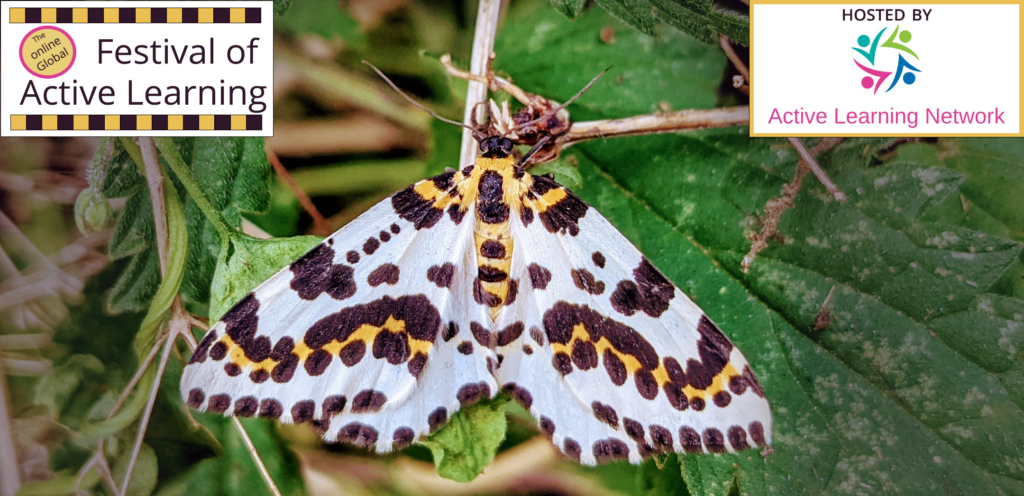
In 2022 the Active Learning Network, with the University of Sussex, Anglia Ruskin University, University of Glasgow, the University of Coventry and other key universities, hosted the second Global Online Festival of Active Learning. The Active Learning Network is a global community supporting the development of teaching and assessment practices that encourage students to take active approaches to their learning. The festival itself is a chance to celebrate playful and innovative strategies for active learning and to showcase approaches to teaching and assessment that others can adopt in their own teaching context.
The festival was attended by over one hundred and eighty participants from seventy different institutions. Feedback was overwhelming positive about the event and comments included:
I am loving this festival and want to thank the organisers, other presenters, and participants. Such a great community of practice. So inspiring!
Really impressive and imaginative use of synchronous and asynchronous modalities.
Fun and engaging as well as meaningful.
Like last year, the festival ran ‘breakfast’ sessions between 9am and 10am and ‘tea time’ sessions between 5pm and 6pm. The idea of these times is that UK participants can join the sessions without interrupting their work day; to encourage people living in eastern nation timezones to join our morning sessions and people living in western nation time zones to join our evening sessions. This idea has been very popular with attendees with over one thousand three hundred sign-ups for different sessions.
Technologies
The festival made extensive use of ‘free’ social technologies, which allowed easy sharing and re-use of texts and materials. For example, contributors to the festival built their slides to create their submission, which then formed part of the programme. The technologies included Eventbrite for booking, Google Slides for the programme, Google Forms for feedback and Wonder.me metaverse for networking and socialising. The University of Sussex Zoom account was used to create ‘Jamming tents’ for the sessions.
Sessions
The online festival ran two types of event: synchronous ‘Jam’ events where we all met together to engage in activities, discuss and build artefacts, usually co-creating digital resources, and asynchronous ‘Moshpit’ events where we engaged in activities and built artefacts in our own time throughout the week.
The ‘Jam’ events
There were twenty-six ‘Jam’ events (including the launch party and closing finale) and there were two or three parallel sessions running at one time. All the sessions were highly interactive with many collaborative writing activities, collage creation and role play.
Many active learning tools were introduced with the technologies that supported them. To name but a few:
- Jamie Heywood from Anglia Ruskin introduced the use of social media in teaching.
- Adam Tate, Bianca Fox and Sandy Cope from Nottingham Trent University used Google Jam Boards so participants could mindmap the challenges of training new members of staff about the use of active learning approaches to their teaching.
- Oliver Haslam and Beth Hammond from the University of the West of England who introduced Seppo, a location-based learning tool.
- Helen Walmsley-Smith and Matt Coombe-Boxall from Staffordshire University asked us to consider leading teaching through the medium of quizzes and multiple-choice questions (MCQs) created by the tutor and students.
- Alison McCandlish from the University of Glasgow introduced Freemix for creating collages.
Many sessions used Padlet and Polleverywhere such as Brena Collyer de Aguiar and Lucila Newell from the Online Distance Learning team at the University of Sussex who used them to discuss the solutions and challenges of delivering distance education. And many used Google apps to co-create documents such as Mary Jacobs from the Aberystwyth University who had us Designing Active Cognitive Tasks and Tab Betts from the University of Sussex in his co-writing session creating a Manifesto for Inclusive and Accessible Education. Environmental sustainability was a theme too with Beatriz Acevedo, Romas Malevicius, Hassiba Fadli and Carmen Lamberti from Anglia Ruskin in their ‘Love, Think and Act project of art and education for sustainability’ and Russell Crawford and Jake Causely from Falmouth University who used a ‘Diamond Nine Curriculum Ladder’ for us to co-create a priority list for embedding environmental sustainability into university curriculum. There was Lego building too and many sessions of ‘Kicking the Hornet’s Nest’ where controversial ideas were presented and discussed.
The ‘Moshpit’ events
There were five asynchronous moshpit events that participants did in their own time. These activities included:
- A ‘Put Yourself on the Map‘ activity which gave a visualisation of where we were connecting from (and where they wanted to be)!
- A ‘Pull Someone into the Moshpit Tent‘ where participants interviewed each other on matters of Active Learning.
- A ‘Walking Tent‘ where participants were invited to go on a daily walking adventure – centred around an Active Learning challenge.
- An ‘Art Tent‘ where participants contributed their artistic creations.
- A ‘Food Tent‘ where participants shared what they were eating and related it to active learning.
That week, lunchtimes became a hive of creativity and celebration for festival attendees.
Summary
The Global Online Festival of Active Learning celebrates teaching strategies that encourage students to actively engage in learning content we are delivering. The TEL team at the University of Sussex, in line with our 2025 strategic framework which foregrounds kindness, integrity, inclusion, collaboration and courage, supports the Active Learning Network and its endeavours to support active learning approaches.
Please visit the Active Learning Network website to find out more about the organisation and sign up to the mailing list.


